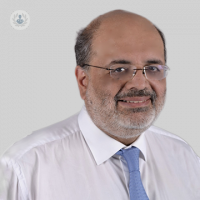Diverticular diseases: frequently asked questions
Written in association with:If you, or someone close to you, is awaiting treatment for diverticular disease, you probably need answers to some very common questions. Mr Savvas Papagrigoriadis is a leading expert in diverticular disease and in this article, he answers common questions that many patients have regarding this condition.

How many forms of diverticulitis exist?
Diverticular disease can either be in the form of diverticulosis, i.e. the presence of diverticula without symptoms or alternatively in one of the following forms:
- Acute diverticulitis
- Acute relapsing diverticulitis
- Chronic diverticulitis
- Symptomatic uncomplicated diverticular disease (SUDD)
- Smouldering diverticulitis
- Complicated diverticulitis (complications)
Each form may require different treatment which can be either medical or surgical. When it comes to surgery, the type of surgery required depends on the form of the condition.
Do I have to have surgery if I have one or two episodes of diverticulitis?
The great majority of patients with diverticulitis don’t require surgery. We don’t rely on the number of episodes to recommend surgery. Instead, we take into account other factors too, such as the severity of the episodes and potential risk of complications. My own research has been focused on discovering treatments for medical management of diverticulitis using mesalazine, probiotics and other means.
Will I need a colostomy bag if I have surgery for diverticulitis?
No, a colostomy is only required for severe complications. Even small perforations of the bowel can be managed without a colostomy these days.
In most cases, there can be laparoscopic surgery with an anastomosis (join of the bowel). In some cases, there may be a temporary ileostomy (diversion), this is closed a few weeks later. One of the reasons some patients are advised to have elective surgery is to avoid the risk of a severe complication and a permanent colostomy.
Can I have symptoms of diverticular disease without evidence of inflammation?
Yes, this is called SUDD (symptomatic uncomplicated diverticular disease). This form can cause annoying chronic symptoms such as abdominal pain, disturbance of bowel motions, bloating, mucous discharge etc but is not dangerous for bowel perforation. SUDD can often be confused with irritable bowel syndrome but needs to be distinguished for appropriate follow-up and treatment with diet, medication and probiotics.
Do antibiotics protect me from diverticulitis
Antibiotics are necessary during the acute attack but cannot prevent future attacks. Current research suggests avoiding the overuse of antibiotics in order to avoid destroying the microbiome, i.e. the bacterial population of the bowel. Current research is directed towards the use of probiotics instead.
Is diverticulitis hereditary?
There is evidence that there is a genetic element. It is not just a condition of old people as erroneously thought previously. Many young patients with diverticular disease have a family history.
Am I at higher risk of episodes if I’m a young patient with diverticulitis?
Yes, there is evidence that younger patients may have more frequent complications. This requires more careful consideration of symptoms and follow-up but not necessarily more surgery.
Visit Mr Savvas Papagrigoriadis’ profile to learn more about his highly esteemed career and to book your first consultation.


